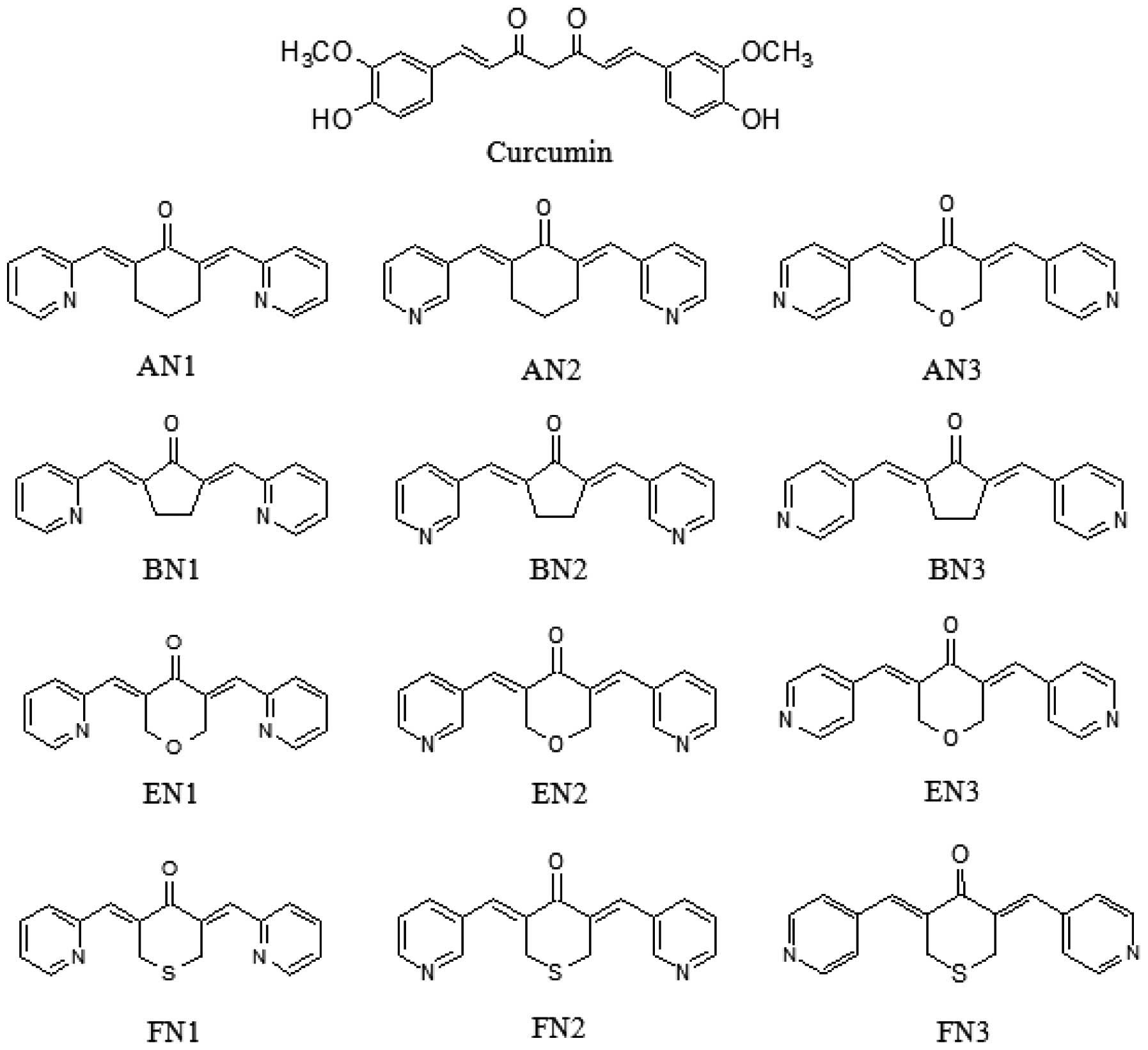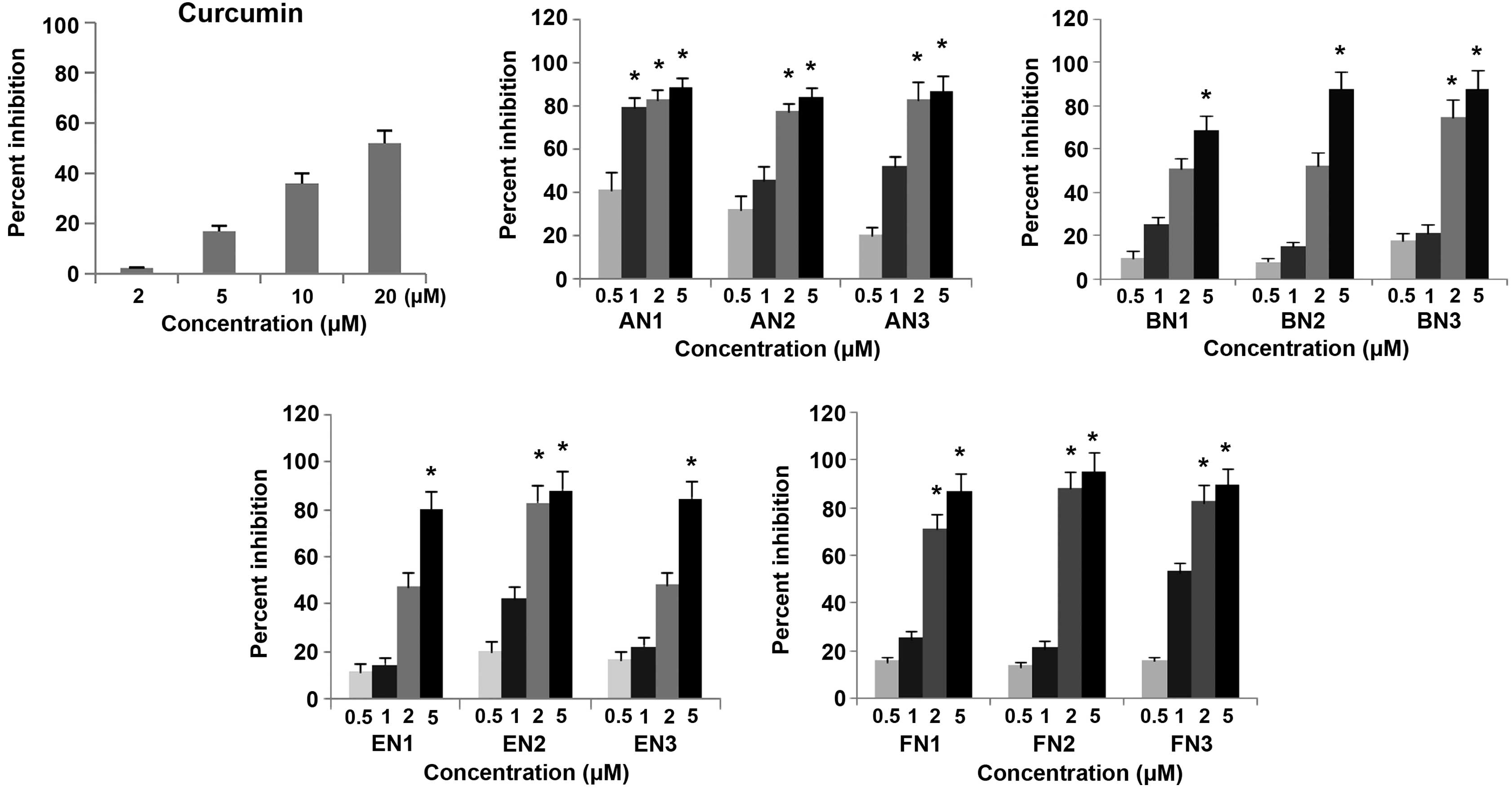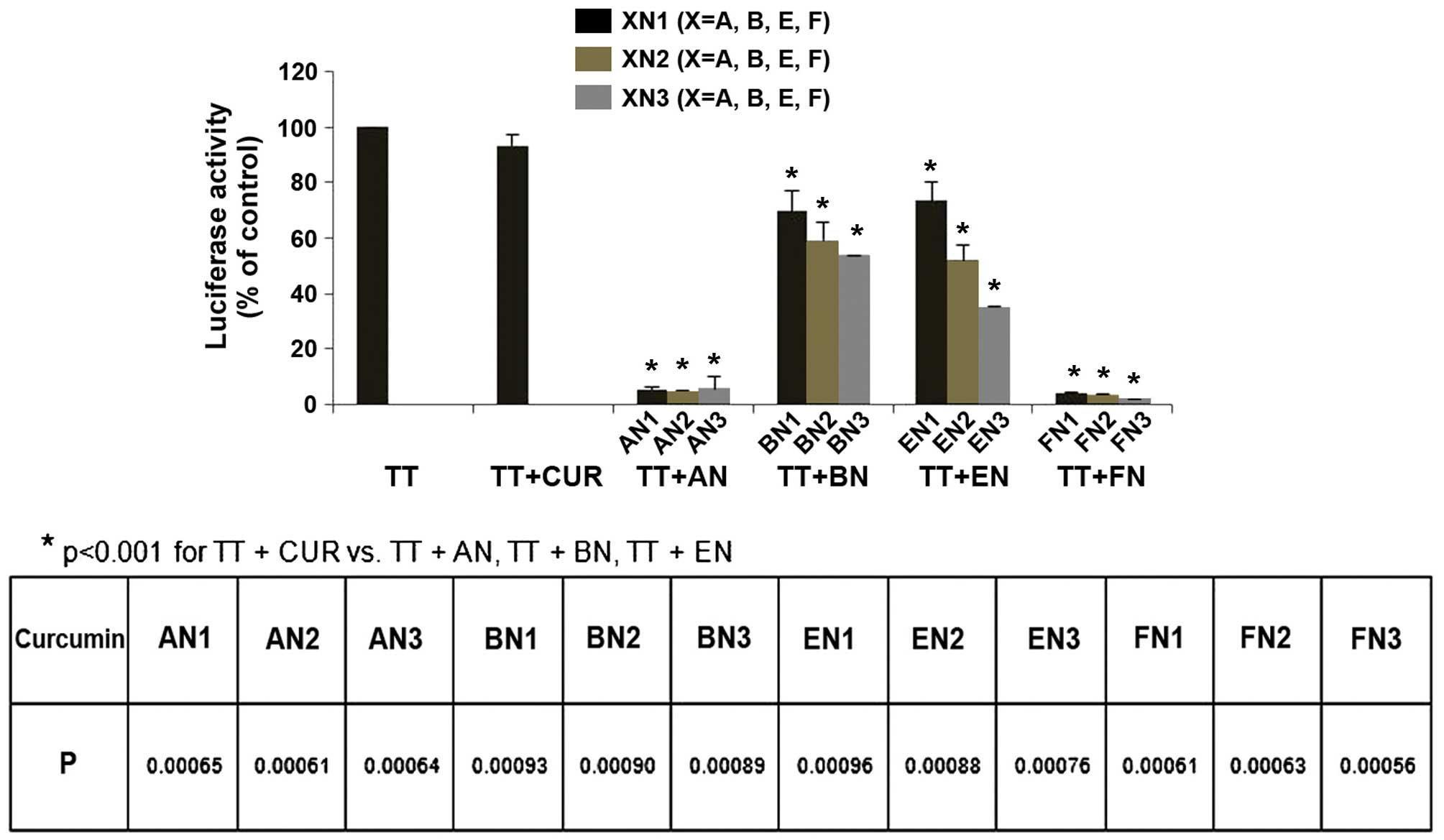|
1
|
Gao W, Bohl CE and Dalton JT: Chemistry
and structural biology of androgen receptor. Chem Rev.
105:3352–3370. 2005. View Article : Google Scholar : PubMed/NCBI
|
|
2
|
Heinlein CA and Chang C: Androgen receptor
in prostate cancer. Endocr Rev. 25:276–308. 2004. View Article : Google Scholar : PubMed/NCBI
|
|
3
|
Klotz L: Hormone therapy for patients with
prostate carcinoma. Cancer. 88(12 Suppl): S3009–S3014. 2000.
View Article : Google Scholar
|
|
4
|
Simmons MN and Klein EA: Combined androgen
blockade revisited: Emerging options for the treatment of
castration-resistant prostate cancer. Urology. 73:697–705. 2009.
View Article : Google Scholar : PubMed/NCBI
|
|
5
|
Kuttan R, Bhanumathy P, Nirmala K and
George MC: Potential anticancer activity of turmeric (Curcuma
longa). Cancer Lett. 29:197–202. 1985. View Article : Google Scholar : PubMed/NCBI
|
|
6
|
Huang MT, Smart RC, Wong CQ and Conney AH:
Inhibitory effect of curcumin, chlorogenic acid, caffeic acid, and
ferulic acid on tumor promotion in mouse skin by
12-O-tetradecanoylphorbol-13-acetate. Cancer Res. 48:5941–5946.
1988.PubMed/NCBI
|
|
7
|
Huang MT, Wang ZY, Georgiadis CA, Laskin
JD and Conney AH: Inhibitory effects of curcumin on tumor
initiation by benzo[a]pyrene and 7, 12-dimethylbenz[a]anthracene.
Carcinogenesis. 13:2183–2186. 1992. View Article : Google Scholar : PubMed/NCBI
|
|
8
|
Huang MT, Lou YR, Ma W, Newmark HL, Reuhl
KR and Conney AH: Inhibitory effects of dietary curcumin on
forestomach, duodenal, and colon carcinogenesis in mice. Cancer
Res. 54:5841–5847. 1994.PubMed/NCBI
|
|
9
|
Rao CV, Rivenson A, Simi B and Reddy BS:
Chemoprevention of colon carcinogenesis by dietary curcumin, a
naturally occurring plant phenolic compound. Cancer Res.
55:259–266. 1995.PubMed/NCBI
|
|
10
|
Leite KR, Chade DC, Sanudo A, Sakiyama BY,
Batocchio G and Srougi M: Effects of curcumin in an orthotopic
murine bladder tumor model. Int Braz J Urol. 35:599–606; discussion
606–607. 2009. View Article : Google Scholar : PubMed/NCBI
|
|
11
|
Agrawal DK and Mishra PK: Curcumin and its
analogues: Potential anticancer agents. Med Res Rev. 30:818–860.
2010.PubMed/NCBI
|
|
12
|
Kunnumakkara AB, Anand P and Aggarwal BB:
Curcumin inhibits proliferation, invasion, angiogenesis and
metastasis of different cancers through interaction with multiple
cell signaling proteins. Cancer Lett. 269:199–225. 2008. View Article : Google Scholar : PubMed/NCBI
|
|
13
|
Teiten MH, Gaascht F, Eifes S, Dicato M
and Diederich M: Chemopreventive potential of curcumin in prostate
cancer. Genes Nutr. 5:61–74. 2010. View Article : Google Scholar : PubMed/NCBI
|
|
14
|
Bill MA, Bakan C, Benson DM Jr, Fuchs J,
Young G and Lesinski GB: Curcumin induces proapoptotic effects
against human melanoma cells and modulates the cellular response to
immunotherapeutic cytokines. Mol Cancer Ther. 8:2726–2735. 2009.
View Article : Google Scholar : PubMed/NCBI
|
|
15
|
Johnson SM, Gulhati P, Arrieta I, Wang X,
Uchida T, Gao T and Evers BM: Curcumin inhibits proliferation of
colorectal carcinoma by modulating Akt/mTOR signaling. Anticancer
Res. 29:3185–3190. 2009.PubMed/NCBI
|
|
16
|
Piantino CB, Salvadori FA, Ayres PP, Kato
RB, Srougi V, Leite KR and Srougi M: An evaluation of the
anti-neoplastic activity of curcumin in prostate cancer cell lines.
Int Braz J Urol. 35:354–360; discussion 361. 2009. View Article : Google Scholar : PubMed/NCBI
|
|
17
|
Kuo CT, Chen BC, Yu CC, Weng CM, Hsu MJ,
Chen CC, Chen MC, Teng CM, Pan SL, Bien MY, et al: Apoptosis
signal-regulating kinase 1 mediates denbinobin-induced apoptosis in
human lung adenocarcinoma cells. J Biomed Sci. 16:432009.
View Article : Google Scholar : PubMed/NCBI
|
|
18
|
Sahu RP, Batra S and Srivastava SK:
Activation of ATM/Chk1 by curcumin causes cell cycle arrest and
apoptosis in human pancreatic cancer cells. Br J Cancer.
100:1425–1433. 2009. View Article : Google Scholar : PubMed/NCBI
|
|
19
|
Thangapazham RL, Sharma A and Maheshwari
RK: Multiple molecular targets in cancer chemoprevention by
curcumin. AAPS J. 8:E443–E449. 2006. View Article : Google Scholar : PubMed/NCBI
|
|
20
|
Anand P, Sundaram C, Jhurani S,
Kunnumakkara AB and Aggarwal BB: Curcumin and cancer: An ‘old-age’
disease with an ‘age-old’ solution. Cancer Lett. 267:133–164. 2008.
View Article : Google Scholar : PubMed/NCBI
|
|
21
|
Dhillon N, Aggarwal BB, Newman RA, Wolff
RA, Kunnumakkara AB, Abbruzzese JL, Ng CS, Badmaev V and Kurzrock
R: Phase II trial of curcumin in patients with advanced pancreatic
cancer. Clin Cancer Res. 14:4491–4499. 2008. View Article : Google Scholar : PubMed/NCBI
|
|
22
|
Cheng AL, Hsu CH, Lin JK, Hsu MM, Ho YF,
Shen TS, Ko JY, Lin JT, Lin BR, Ming-Shiang W, et al: Phase I
clinical trial of curcumin, a chemopreventive agent, in patients
with high-risk or pre-malignant lesions. Anticancer Res.
21:2895–2900. 2001.PubMed/NCBI
|
|
23
|
Wei X, Du ZY, Zheng X, Cui XX, Conney AH
and Zhang K: Synthesis and evaluation of curcumin-related compounds
for anticancer activity. Eur J Med Chem. 53:235–245. 2012.
View Article : Google Scholar : PubMed/NCBI
|
|
24
|
Zhou DY, Ding N, Van Doren J, Wei XC, Du
ZY, Conney AH, Zhang K and Zheng X: Effects of curcumin analogues
for inhibiting human prostate cancer cells and the growth of human
PC-3 prostate xenografts in immunodeficient mice. Biol Pharm Bull.
37:1029–1034. 2014. View Article : Google Scholar : PubMed/NCBI
|
|
25
|
Aggarwal BB: Prostate cancer and curcumin:
Add spice to your life. Cancer Biol Ther. 7:1436–1440. 2008.
View Article : Google Scholar : PubMed/NCBI
|
|
26
|
Nakamura K, Yasunaga Y, Segawa T, Ko D,
Moul JW, Srivastava S and Rhim JS: Curcumin down-regulates AR gene
expression and activation in prostate cancer cell lines. Int J
Oncol. 21:825–830. 2002.PubMed/NCBI
|
|
27
|
Tsui KH, Feng TH, Lin CM, Chang PL and
Juang HH: Curcumin blocks the activation of androgen and
interlukin-6 on prostate specific antigen expression in human
prostatic carcinoma cells. J Androl. 29:661–668. 2008. View Article : Google Scholar : PubMed/NCBI
|
|
28
|
Anand P, Kunnumakkara AB, Newman RA and
Aggarwal BB: Bioavailability of curcumin: Problems and promises.
Mol Pharm. 4:807–818. 2007. View Article : Google Scholar : PubMed/NCBI
|
|
29
|
Adams BK, Ferstl EM, Davis MC, Herold M,
Kurtkaya S, Camalier RF, Hollingshead MG, Kaur G, Sausville EA,
Rickles FR, et al: Synthesis and biological evaluation of novel
curcumin analogs as anti-cancer and anti-angiogenesis agents.
Bioorg Med Chem. 12:3871–3883. 2004. View Article : Google Scholar : PubMed/NCBI
|
|
30
|
Basile V, Ferrari E, Lazzari S, Belluti S,
Pignedoli F and Imbriano C: Curcumin derivatives: Molecular basis
of their anti-cancer activity. Biochem Pharmacol. 78:1305–1315.
2009. View Article : Google Scholar : PubMed/NCBI
|
|
31
|
Ishida J, Ohtsu H, Tachibana Y, Nakanishi
Y, Bastow KF, Nagai M, Wang HK, Itokawa H and Lee KH: Antitumor
agents. Part 214: Synthesis and evaluation of curcumin analogues as
cytotoxic agents. Bioorg Med Chem. 10:3481–3487. 2002. View Article : Google Scholar : PubMed/NCBI
|
|
32
|
Ohori H, Yamakoshi H, Tomizawa M, Shibuya
M, Kakudo Y, Takahashi A, Takahashi S, Kato S, Suzuki T, Ishioka C,
et al: Synthesis and biological analysis of new curcumin analogues
bearing an enhanced potential for the medicinal treatment of
cancer. Mol Cancer Ther. 5:2563–2571. 2006. View Article : Google Scholar : PubMed/NCBI
|
|
33
|
Zhou J, Geng G, Shi Q, Sauriol F and Wu
JH: Design and synthesis of androgen receptor antagonists with
bulky side chains for overcoming antiandrogen resistance. J Med
Chem. 52:5546–5550. 2009. View Article : Google Scholar : PubMed/NCBI
|
|
34
|
Shi Q, Shih CC and Lee KH: Novel
anti-prostate cancer curcumin analogues that enhance androgen
receptor degradation activity. Anticancer Agents Med Chem.
9:904–912. 2009. View Article : Google Scholar : PubMed/NCBI
|


















